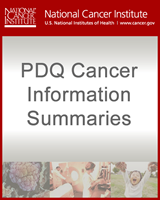From: Genetics of Breast and Gynecologic Cancers (PDQ®)

NCBI Bookshelf. A service of the National Library of Medicine, National Institutes of Health.
Figure 3. Lynch syndrome pedigree. This pedigree shows some of the classic features of a family with Lynch syndrome, including affected family members with colon cancer or endometrial cancer, a young age at onset in some individuals, and incomplete penetrance. Lynch syndrome families may exhibit some or all of these features. Lynch syndrome families may also include individuals with other gastrointestinal, gynecologic, and genitourinary cancers, or other extracolonic cancers. As an autosomal dominant syndrome, Lynch syndrome can be transmitted through maternal or paternal lineages, as depicted in the figure. Because the cancer risk is not 100%, individuals who have Lynch syndrome may not develop cancer, such as the mother of the female with colon cancer diagnosed at age 37 years in this pedigree (called incomplete penetrance).
From: Genetics of Breast and Gynecologic Cancers (PDQ®)

NCBI Bookshelf. A service of the National Library of Medicine, National Institutes of Health.